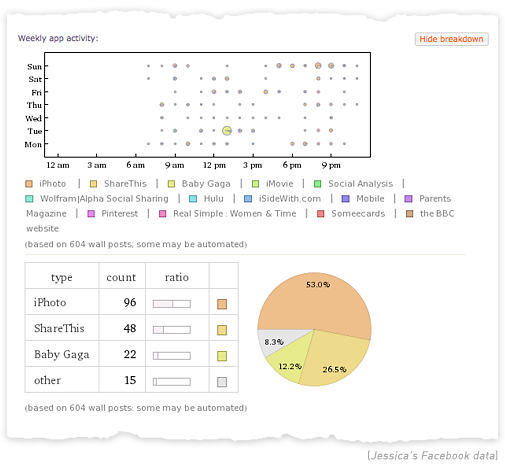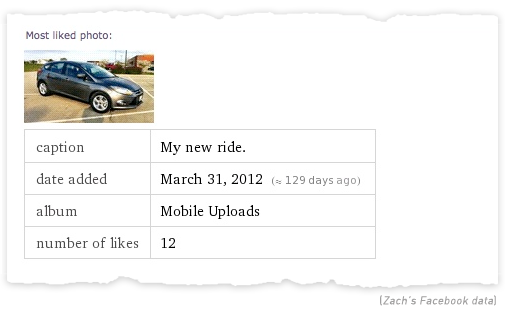Note added: Since this was written, Facebook has modified their API to make much less information available about Facebook friends. While I think adding privacy controls is a good idea, what Facebook has done reduces the richness of the results that Wolfram|Alpha Personal Analytics can give for Facebook users.
After I wrote about doing personal analytics with data I’ve collected about myself, many people asked how they could do similar things themselves.
Now of course most people haven’t been doing the kind of data collecting that I’ve been doing for the past couple of decades. But these days a lot of people do have a rich source of data about themselves: their Facebook histories.
And today I’m excited to announce that we’ve developed a first round of capabilities in Wolfram|Alpha to let anyone do personal analytics with Facebook data. Wolfram|Alpha knows about all kinds of knowledge domains; now it can know about you, and apply its powers of analysis to give you all sorts of personal analytics. And this is just the beginning; over the months to come, particularly as we see about how people use this, we’ll be adding more and more capabilities.
It’s pretty straightforward to get your personal analytics report: all you have to do is type “facebook report” into the standard Wolfram|Alpha website.
If you’re doing this for the first time, you’ll be prompted to authenticate the Wolfram Connection app in Facebook, and then sign in to Wolfram|Alpha (yes, it’s free). And as soon as you’ve done that, Wolfram|Alpha will immediately get to work generating a personal analytics report from the data it can get about you through Facebook.
Here’s the beginning of the report I get today when I do this:

Yes, it was my birthday yesterday. And yes, as my children are fond of pointing out, I’m getting quite ancient…
I have to admit that I’m not a very diligent user of Facebook (mostly because I have too many other things to do). But I’ve got lots of Facebook friends (most of whom, sadly, I don’t know in real life). And scrolling down in my Wolfram|Alpha personal analytics report, I see this:

Quite a geographic distribution! 85 countries, it says. Nobody from Antarctica, though…
Here’s the age distribution, at least for people who give that data (I do wonder about those 100+ year olds…):

But these kinds of things are just the beginning. When you type “facebook report”, Wolfram|Alpha generates a pretty seriously long report—almost a small book about you, with more than a dozen major chapters, broken into more than 60 sections, with all sorts of drill-downs, alternate views, etc.
Here’s today’s report for me—which would be a lot longer if I were a more diligent Facebook user:

Let’s talk about some of the details. I wish I could do this using my own Facebook data—but I’m just not enough of a Facebook user. So instead I’m going to use data from a few kind souls around our company who’ve agreed to let me share some of their personal analytics.
Close to the top of the report—at least for younger folk—there’s an immediate example of how Wolfram|Alpha’s computational knowledge is used. If it knows from Facebook when and where you were born, it can work out things like what the weather was like (down to the hour in most places—a good memory test for parents!):

In the standard Wolfram|Alpha Facebook personal analytics report, one of the first major sections is about your general Facebook activity. Here are some results for someone who’s definitely a much more serious Facebook user than me:

There’s a peak in activity late last fall, when no doubt something was going on in this person’s life. Wolfram|Alpha shows the weekly distribution of all these updates:

One can see she does lots of photo posting on Sunday nights, at the end of the weekend. Then there’s a clear gap for sleep, and during standard business hours it’s primarily links and status updates…
What apps does she use? Here’s data on that. Why is there all that Baby Gaga on Tuesdays? I’m guessing that’s something automated.

So what’s in someone’s posts? Here’s another part of the standard report, now for a different person:

That’s a nice “most liked post”. Clearly this person (who happens to be the lead developer of the Wolfram|Alpha Facebook personal analytics system that I’m showing here) is pretty upbeat. Look at the word cloud from his posts:

Here’s someone else’s word cloud—notably with her children’s names ordered in size according to age:

You can also look at all sorts of analysis of check-ins, photos, responses to posts, and so on. You can find out which of your posts or photos are most liked, at what times, and by whom:

A big part of the report Wolfram|Alpha generates is actually not about you, but about your friends.
Like here’s the gender distribution for one person’s friends:

And here’s their relationship distribution… showing that, yes, as they get older, this person’s friends mostly tend to get progressively more “hitched”:

It’s fun to see what names are common among your friends:

And you can find out things like who you share the most friends with. (For me—with my rather uncurated friend collection—the results were pretty surprising: 2 of the top 5 were people I’d never heard of… though now of course I’m curious about them…)
Your whole network of friends can actually be shown and analyzed as a network. Here’s my network of friends (restricted to female friends, to reduce the number). I’m the big dot at the center. Each other dot represents a friend, arranged based on mutual friendships.

It’s clearer if I take myself out of the picture, and just show how my friends are connected to each other:

The size of each dot is proportional to the number of friends from my network that that person has. The network is laid out automatically by Wolfram|Alpha, and the colors represent different clusters of friends. It’s interesting to see who my “big connectors” are. If you roll over each dot, you’ll see who it is. The “connector” highlighted here happens to be a long-time former HR director at our company…
Different people seem to end up with very different-looking networks. Here are a few examples:

Sometimes there’s a “biggest connector”—perhaps someone’s spouse. Sometimes there are lots of disjoint clusters (secret lives?). Sometimes—like for my complete friend network, shown in the bottom right—it’s just a big mess, indicating an uncurated collection of friends. And of course you can also use Wolfram|Alpha to do all kinds of fancy graph theory on your friend network—trying to learn for example what “cliques” (in the official graph-theoretic sense) you’re involved with…
OK, so let’s say you’ve found something interesting in your personal analytics report. What can you do with it? We recently introduced a feature called Clip ’n Share. Roll over an image, and a “share” icon comes up. Click it, and you can create a permanent web page that you can link to from Facebook or wherever.

OK, so that’s some of what you can do with your Wolfram|Alpha personal analytics report. But you can actually get a report not just on yourself, but also (so long as they allow it) on your friends. Just enter “facebook friends” in Wolfram|Alpha to get a list of links to your friends, then follow a link to get the personal analytics report for that friend. (Sometimes you’ll see less than in your own report, because your friends don’t allow you as much access to their data.)
It’s quite fascinating—and sometimes revealing—looking at the personal analytics reports for oneself and one’s friends. I think I could spend ages doing it. And coming back at different times to see what’s changed.
The personal analytics system we’re releasing today is just the beginning. We’re looking forward to everyone’s feedback (use the feedback box at the bottom!)—and we’re planning to keep adding more and more features and capabilities. As I said in my original post about personal analytics, I’ve no doubt that one day pretty much everyone will routinely be doing all sorts of personal analytics on a mountain of data that they collect about themselves. But it’s exciting today to be able to start that off with Wolfram|Alpha Personal Analytics for Facebook. I hope people have fun with it! And perhaps it will also inspire some young Facebook users to become data scientists…
